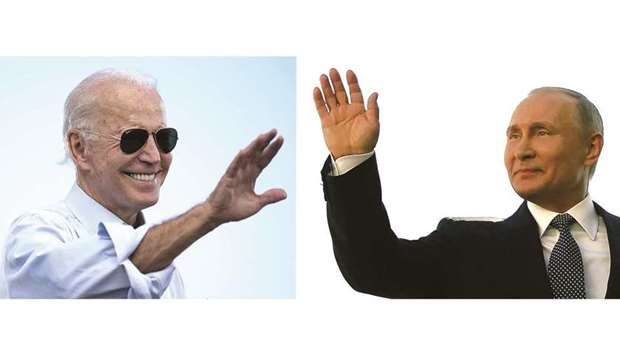President Joe Biden landed yesterday in Geneva on the eve of his first summit with Vladimir Putin, a meeting the White House hopes will set clear “red lines” preventing the combustible US-Russia relationship from further deterioration.
“I’m always ready,” the US president told reporters with a smile, when asked if he was prepared for the tense encounter.
Biden and Putin will huddle for hours today at an elegant lakeside La Grange villa in Geneva, a setting reminiscent of the Cold War summit between US president Ronald Reagan and Soviet leader Mikhail Gorbachev in the Swiss city in 1985.
One of the few things both sides can agree on is that relations between Moscow and Washington are at about their lowest ebb since the distant days of the US-Soviet superpower stand-off.
This time, tensions are less about strategic nuclear weapons and competing ideologies than what the Biden administration sees as an increasingly rogue, authoritarian Russian state.
From cyberattacks on US entities and meddling in the last two US presidential elections, to human rights violations and aggression against Ukraine and other European countries, the US list of allegations against the Kremlin runs long.
In an interview with NBC ahead of the summit, Putin scoffed at US accusations.
As well as denying any connection to what the United States says are Russia-based hacking and ransomware gangs, Putin rejected having any hand in the deaths of many of his opponents during two decades in power.
Addressing one of the main irritants in relations with Washington and with the European Union, Putin insisted he also could not be blamed for the near-fatal poisoning and subsequent imprisonment of Alexei Navalny, one of the few remaining Russian opposition figures.
A small group of demonstrators, some wearing “Free Navalny” T-shirts, gathered in Geneva yesterday evening, calling for the dissident’s release and chanting “Russia without Putin”.
Yuri Ushakov, Putin’s foreign affairs adviser, told journalists in Moscow the US-Russian relationship was “at an impasse” and “close to critical”.
There were some grounds for optimism, albeit “not much”, he added.
Biden’s team is also downplaying the chances of major change. Success, says the White House, would be simply managing to lower the temperature and forging a “predictable, stable” relationship.
The US side is “not expecting a big set of deliverables”, the senior Biden official said.
The Swiss hosts, who are running a massive security operation during the summit, stressed the importance of the meeting.
“Switzerland is convinced that a constructive dialogue between the great powers is needed to face the challenges of our times,” President Guy Parmelin told reporters after meeting Biden.
After a year and a half of grappling with the devastating Covid-19 pandemic, the US and Russian leaders had the chance to “inject a bit more optimism, a bit more hope into global politics”, he added.
Biden — flying into Geneva from Brussels after back-to-back summits with the EU, Nato and the G7 group of allies — meanwhile said he wants to establish clear “red lines” for what the White House will no longer tolerate.
“I’m not looking for conflict with Russia, but... we will respond if Russia continues its harmful activities,” Biden said after his Nato meeting on Monday.
In something of a pivot from his previous characterisation of Putin as a “killer”, Biden upgraded the Russian leader to a “tough” and “worthy adversary”.
Going into the summit, Biden has emphasised that he has the backing of his Western partners.
Russia was one of the top topics at the Nato summit in Brussels, where the defence alliance warned that Russian military build-ups on the edge of eastern Europe “increasingly threaten the security of the Euro-Atlantic area and contribute to instability along Nato borders and beyond”.
For all the bruising rhetoric, the White House is keen to emphasise that it wants to do business in a limited way with Russia. Officials point to the recent extension of the New START nuclear arms limitation treaty as an example of successful diplomacy.
According to Ushakov, one possible baby step might be a quick reinstatement of the two countries’ ambassadors, who returned home this year in response to tensions.
Officials from the two sides say the leaders will initially meet with only translators and US Secretary of State Antony Blinken and his Russian counterpart, Foreign Minister Sergei Lavrov.
They will then switch to a larger format, with five officials accompanying each leader.
However, unlike in 2018, when Biden’s predecessor Donald Trump met Putin, there will be no joint press conference.
The US side is clearly anxious to avoid the optics of having Biden sharing that kind of platform with the Russian president.
In 2018, Trump caused a stir by saying, as Putin stood beside him, that he believed the Kremlin leader over his own intelligence services when it came to accusations of Russian interference in the 2016 US presidential election that brought Trump to power.

GENEVA CALLING: US President Joe Biden (L) and Russian President Vladimir Putin. (AFP)
